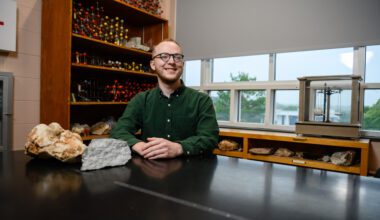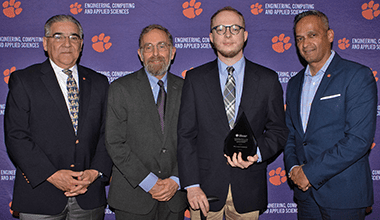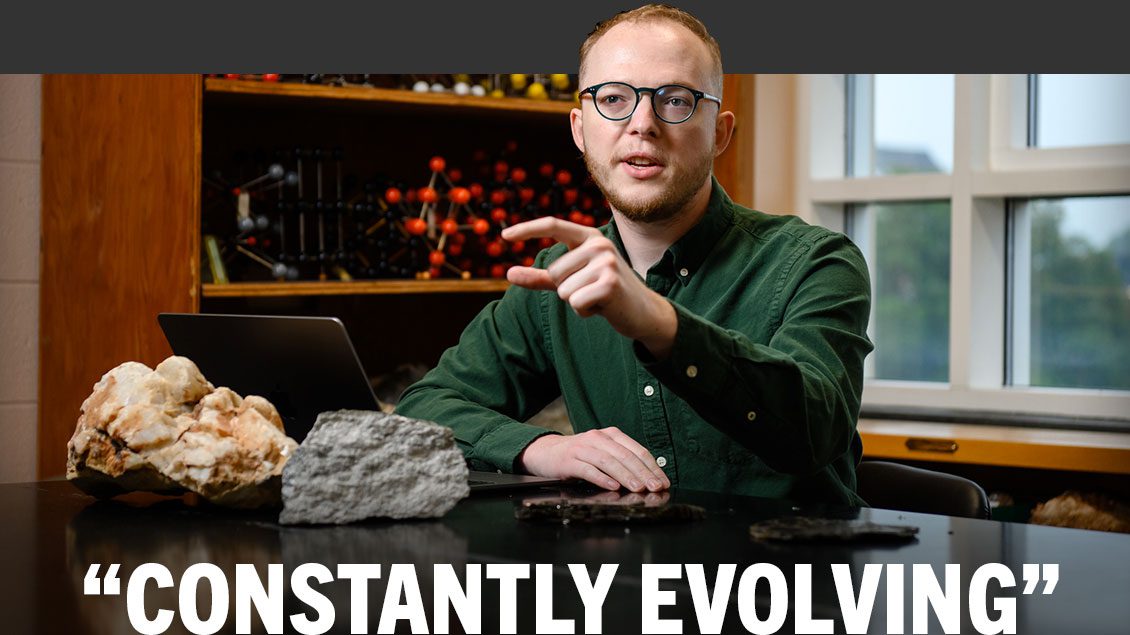William Cummings thought the trouble he was having with his vision might have been allergies, but it became impossible to ignore while on his way to the Greenville bakery where he worked.
“I went to turn out of my neighborhood onto Woodruff Road, and I couldn’t see oncoming traffic, so I had to pull over and call in,” he remembered. “I was like, ‘I’m so sorry, I’m not going to make it. I don’t know what is going on.'”

A few doctor’s visits later he had his answer. Cummings, then age 24, had acute lymphoblastic leukemia.
The diagnosis set him on course for a long, sometimes solitary recovery during the peak of the COVID-19 pandemic. But it also jarred him onto a new path in life, one that would take him to Clemson University, where he has been a standout student.
Cummings, now 28, is on track to graduate in May with a Bachelor of Science in geology and plans to stay with Clemson at least another year to complete a master’s degree program that he began as an undergraduate.
His determination and perseverance have left an impression on several faculty members, including Brady Flinchum, assistant professor of environmental engineering and Earth sciences.
“His curiosity and his way of digesting information and asking questions strike me more as a Ph.D. student than a master’s student,” Flinchum said. “It wouldn’t surprise me if he ended up teaching or doing research somewhere.”
His best shot
In the summer of 2020, Cummings stayed at Prisma Health Greenville Memorial Hospital while undergoing chemotherapy. His family was not allowed to visit because of the pandemic, and he remembers passing some of those days by watching through the window as people waited in line to be tested for COVID-19.
Cummings was discharged from the hospital after a month and returned about a month after that for a stem-cell transplant, his best shot at rebooting his immune system. His sister was the donor, Cummings said. So far, he has needed only one transplant.
“For blood levels to come back to normal and to get back to previous strength and energy, it takes a while,” Cummings said. “The main concern is that you are very, very immunocompromised. In an ordinary time, you would just treat it by staying at home or maybe wearing a mask. But during COVID, man, I didn’t go anywhere for a while.”
But there was something he could do from home– take classes. Cummings enrolled at Greenville Technical College a few months after his transplant.
He went on to secure an associate’s degree and transferred in spring 2022 to Clemson, where he chose geology as his major, partly to reconnect with the Earth and partly because his leukemia diagnosis left him with questions.
It can be hard to pinpoint what caused the kind of cancer he had, Cummings said. Pollution, benzene exposure and radon gas could all be factors, he said.
“I was really curious about how that worked,” he said. “How do we know so much at this point about cancer treatment but know so little about environmental prevention?”
Going to California
Cummings remembers seeing a posting in that first semester at Clemson for an opportunity to assist with geophysics research. He signed up and was soon on his way to Southern California to help Flinchum with data collection.
Cummings learned techniques such as LiDAR, seismic refraction, DC electrical resistivity surveys and ground-penetrating radar.
“After my first semester, I was already in research,” Cummings said. “I think that is a very lucky thing that happened, and I think that is something that could only happen at a school and in a department that really encourages students to do something like that.”
Cummings has also participated in research as an intern at the Clemson Center for Geospatial Technologies. The center assists researchers across the University, giving him the opportunity to learn about issues outside of hydrogeology, his area of study.
In one mapping project, for example, Cummings is helping a team identify gaps in diabetes coverage across the state and write a research paper about it. He has also volunteered time with a club, Clemson Mappers, to teach how to map infrastructure in regions affected by humanitarian crises such as earthquakes and conflicts.
Patricia Carbajales-Dale, executive director of the Clemson Center for Geospatial Technologies, said that Cummings has analytical talents but also empathy and personality. He is often tapped to speak with donors or high school students on tours, she said.
Through it all, Cummings maintains a smile and a distinctive cheeriness, Carbajales-Dale said.
“He just adapts very well to all different scenarios, and that’s what makes him so amazing,” she said.
Looking at Ph.D. programs
In one of his final hurrahs as an undergraduate, Cummings went to a ceremony in the Madren Conference Center where he collected an award from the College of Engineering, Computing and Applied Sciences that recognized him as the Outstanding Senior in the School of Computing or Applied Sciences.

It was an honor that would have to substitute for a commencement ceremony. Cummings, who has maintained a 4.0 grade point average, won’t be able to make it to the May 10 ceremony at Littlejohn Coliseum because he is having a hip replaced after his last exam. It is a late side effect from his cancer treatment, he said.
But Cummings plans to be on his feet as early as the day of the surgery and to continue moving forward with his new hip. He said he will be back at Clemson in the fall to finish his master’s in hydrogeology.
“I’m constantly evolving,” he said. “I never imagined I would want to go for another degree, but these days, I’m thinking about looking at Ph.D. programs.”
Get in touch and we will connect you with the author or another expert.
Or email us at news@clemson.edu

